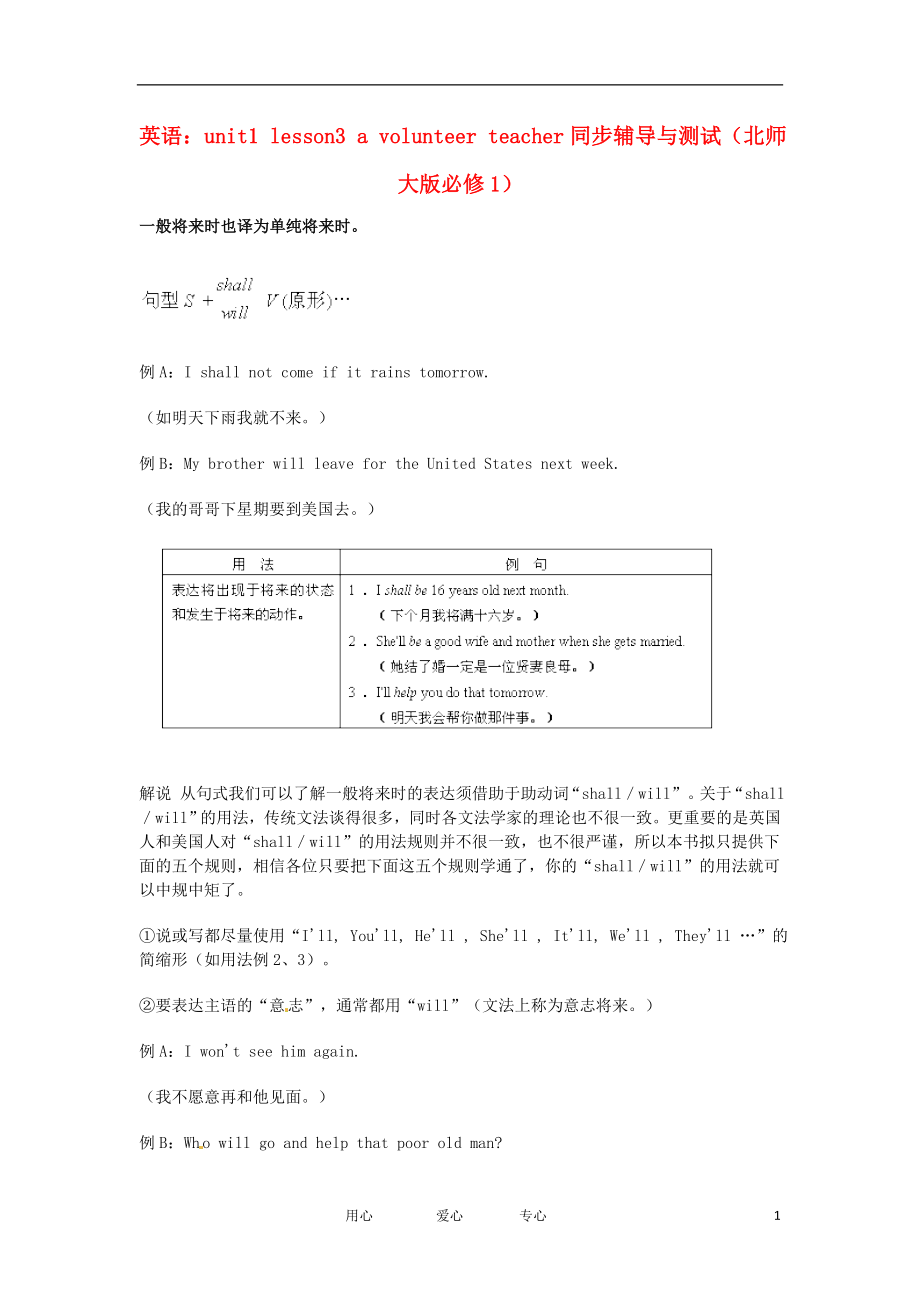《英語:unit1 lesson3 a volunteer teacher同步輔導(dǎo)與測試(北師》由會員分享����,可在線閱讀,更多相關(guān)《英語:unit1 lesson3 a volunteer teacher同步輔導(dǎo)與測試(北師(5頁珍藏版)》請在裝配圖網(wǎng)上搜索���。
1�、
英語:unit1 lesson3 a volunteer teacher同步輔導(dǎo)與測試(北師大版必修1)
一般將來時也譯為單純將來時�。
?
例A:I shall not come if it rains tomorrow.
(如明天下雨我就不來。)
例B:My brother will leave for the United States next week.
(我的哥哥下星期要到美國去���。)
?
解說 從句式我們可以了解一般將來時的表達須借助于助動詞“shall/will”�。關(guān)于“shall/will”的用法����,傳統(tǒng)文法談得很多�,同時各文法學家的理論也不很一致。更重要的是
2���、英國人和美國人對“shall/will”的用法規(guī)則并不很一致�,也不很嚴謹��,所以本書擬只提供下面的五個規(guī)則��,相信各位只要把下面這五個規(guī)則學通了,你的“shall/will”的用法就可以中規(guī)中矩了����。
①說或?qū)懚急M量使用“I'll, You'll, He'll , She'll , It'll, We'll , They'll …”的簡縮形(如用法例2、3)���。
②要表達主語的“意志”����,通常都用“will”(文法上稱為意志將來��。)
例A:I won't see him again.
(我不愿意再和他見面��。)
例B:Who will go and help that poor old man?
3�、
(誰愿意去幫助那個可憐的老人?)
Mary will . (瑪莉愿意�。)
③說話者要把自己的“意志”表達或行使出去,通常用“shall”����。
例A:You shall not do that again.
(你不可以再做那樣的事。)
例B:He shall return that book tomorrow.
(明天他必須把那本書歸還。)
④第一人稱問句使用“shall”����。
例A:Shall I call you a taxi ?
(需要我替你叫一輛出租車嗎?)
例B:Shall we tell her the truth ?
(我們可以把實情告訴她嗎�����?)
⑤問句是
4���、“Shall…?”�����,答句就用“shall ~”�;問句用“Will …�����?”�,答句就用“will ~ ”。
例A:Shall you go to school tomorrow ?
(你明天須要上學去嗎���?)
Yes, I shall . We'll have an exam .
(是的���,我必須去�。我們明天有考試�。)
例B:Will you go to school with me tomorrow?
(明天你要不要和我一道去學校?)
No, I won't . I'm going on a picnic.
(我不要����。我已定好要去郊游�����。)
注:Let's …”的附加疑問通常使用
5���、“…, shall we ?”����。
Let's have a rest, shall we?
(我們休息一下���,怎樣���?)
一般將來時除了使用“shall/will + V…”以外,也可以使用下列的幾種句式來表達�����。
1.be going to + V … (即將會……;打算將……)
例A:It is going to rain. Take an umbrella with you.
(帶一把傘去����。看樣子就要下雨了�����。)
例B:The Browns are going to move to Australia.
(布朗先生全家打算遷移到澳大利亞去���。)
2.be about to
6���、 + V (即將……,指緊接著要發(fā)生的動作�����。)
例:Let's wait a minute. He is about to arrive.
(我們等一下�。他即將會到達。)
3.be + V-ing …(定于……���,指接近的將來動作��。)
例:He is leaving for Hong Kong tomorrow morning.
(他定于明天早晨到香港去��。)
4.be + to V (定于……����,指預(yù)定的將來動作。)
例:She is to be here at 9:00 a.m. tomorrow. :
(她定于明晨九時到達這里���。)
5.V-(e)s (定于……���,指接近的
7����、將來動作,但不如第3項主觀�。)
例:He leaves for Hong Kong tomorrow morning.
(他定于明天早晨到香港去?��!c(3)項的區(qū)別在于(3)項的動作是出自主語的決定����,(5)項則不一定是出自主語的決定����。)
常用于修飾一般將來時的時間副詞有:tomorrow, tomorrow morning (afternoon, evening), next + 時間 (next night, next Monday …, next week, month…, next summer…, next year), in (the) future (將來)���,soon (
8、不久之后)�����,in +時間 (in five days——再過五天���,in two weeks——再過二星期)�,etc.
Drilling Square
Ⅰ.請在下列各題空格處填入shall或will���。
1.You ______ not drive through a red light.
2.I ______ do everything for her.
3.______ you help me with this heavy bag, John?
4.______ I help you with that heavy bag, Madam?
5.Let's go and ta
9��、ke a walk after dinner, ______ we?
6."No one ______ leave the classroom if I haven't said Okay," said the teacher.
7.It ______ soon be over, I am sure.
8.Do what you ______ , but don't go out.
9.I ______ take you there with me, if it's OK with your mother.
10.Rain or shine, I ______ come.
Ⅱ.請在
10��、下列各題空格處就所設(shè)動詞給予適當?shù)膶頃r�。
1.A:How do you want to go to Hualain, by air or by train?
B:I am not in a hurry this time, so I (1) take the train.
2.A:(2) (you like) to go to the game this afternoon?
B:I'd love to. Where (3) (we meet) ?
A:You just stay home and wait for me. I (4) drive my car there, so
11��、I (5) (pick) you up at about 1:30 .
3.A:It's a good dictionary . I (6) (buy) it, but I don't have money with me now.
B:Don't worry. I (7) (lend) you.
4.A:I hear Miss Chen (8) leave our school and teach in a bigger school in Taipei.
B:But the principal (校長) (9) not let her go . He says she (10) teach at least for another semester until he finds a new teacher.
s
5
用心 愛心 專心
 英語:unit1 lesson3 a volunteer teacher同步輔導(dǎo)與測試(北師
英語:unit1 lesson3 a volunteer teacher同步輔導(dǎo)與測試(北師

